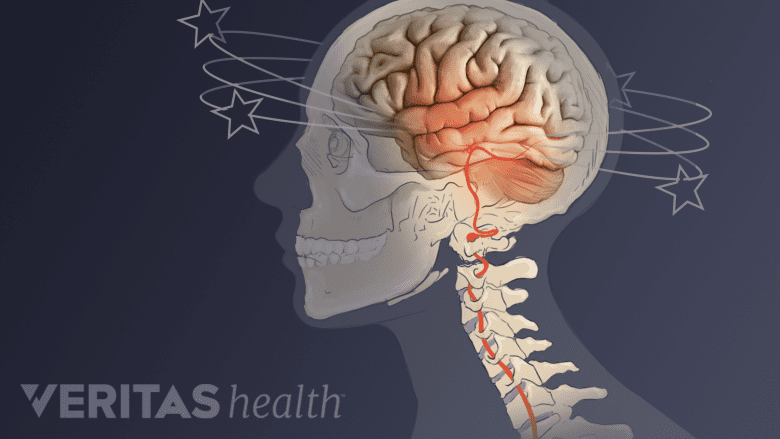The symptoms of concussion can be divided into four categories: thinking and remembering; physical; emotional and mood; and sleep. Many people with concussions report that they do not feel like themselves.

Dizziness is a potential symptom of concussion that varies based on the severity of the injury.
In This Article:
Symptoms can worsen if the brain is strained by physical activity, such as running and climbing stairs, or cognitive activity, such as academic work or multitasking.
Difficulty thinking and remembering
People who experience concussion may have trouble with cognitive functions. Specifically, they may notice that they:
- Have trouble remembering new information
- Feel “foggy” and can’t think clearly or concentrate
- Feel slower than normal
These cognitive symptoms mean everyday tasks take more time and mental effort than usual.
Physical symptoms
Which physical symptoms a patient experiences can depend on the individual, and the severity of the injury. Potential physical symptoms include:
- Headache (most common)
- Dizziness
- Nausea and vomiting
- Balance problems
- Blurry vision or other visual problems
- Sensitivity to light and/or noise
- Fatigue
- Numbness or tingling
Some symptoms, particularly symptoms that get progressively worse, may be a sign of brain hemorrhage. A person who has a persistent or worsening headache, weakness or numbness, decreased coordination, repeated vomiting or nausea, or slurred speech, should be taken to the emergency department for evaluation.
See Concussion and the Risk of Blood Clot
Emotional and mood symptoms
In addition to physical and cognitive symptoms, people with concussions may experience emotional and mood symptoms. Specifically they may feel:
- Irritable
- Sad
- More emotional
- Anxious or nervous
It is often difficult for a medical professional to know if these symptoms were present before the injury or a result injury. Patients are advised to tell their doctor about perceived changes in emotions and mood.
Change in sleep patterns
During concussion recovery a person may:
- Feel sleepy during the day
- Have difficulty falling asleep
- Sleep more hours than usual
- Sleep fewer hours than usual
Because sleep is essential to recovery, people who have trouble falling asleep or suffer from insomnia are advised to report it to their doctors.
Because of the nature of their injury, people who suffer concussions are not always able to accurately report symptoms. It can be helpful for a friend or family member to accompany the injured person to the hospital or doctor’s office and report observations.


